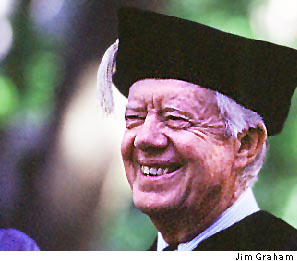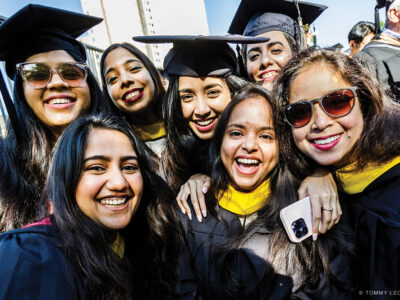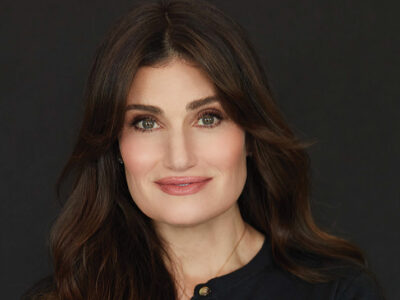
“Commencement,” says Barbra Streisand’s character in the 1973 film The Way We Were. “A funny word for the end.”
And so Penn’s 242nd Commencement ceremonies brought the graduates’ student days to an end last month. But as the life of this year’s speaker makes clear, endings are often just a way of getting started again. For former President Jimmy Carter, the end of his presidency marked the beginning of a highly productive career as head of the Carter Center in Atlanta, free-lance troubleshooter, and humanitarian activist (see sidebar on this year’s honorands on p. 14), one that has taken him to 125 countries since leaving office. That international perspective informed both his own speech and that of Andrea Mitchell, CW’67, this year’s Baccalaureate speaker.
On the sun-kissed morning of May 18 — as Franklin Field flags snapped in the breeze and beachballs bounced across the rows of dark-robed graduates — Carter offered a sometimes- sobering homily. It was a mixture of praise and gentle scolding, reminders of great accomplishments and exhortations to meet the moral challenges ahead.
“I am very proud of this great university and filled with admiration for what has been done here,” he said, his Georgia-accented voice sometimes rising over the field like the students’ balloons, sometimes dropping below the threshold of hearing. Then, drawing on his work in Africa, he recalled how several African cabinet ministers had told him that American universities were “rarely relevant” for their countries, since the research conducted by the scholars is seldom shared “with those needing to know.”
After urging the students to resist the “encapsulated environment” — there is an “inclination in all of us to build around ourselves a secure place to live,” he said — Carter argued that the “worst discrimination on earth” today is not that of race or ethnicity or religion but of “rich people against poor people.” And by his definition, “everyone in this stadium is rich.” While that socio-economic discrimination may not be “filled with hatred or animosity,” he said, it nonetheless “permeates the human race.” To illustrate how seldom we “break down the chasm” separating the haves and the have-nots, he asked pointedly: “How many of us actually know a poor family?” — not just in an abstract way but “learning the names of their teenage kids or, God forbid, inviting them to our house and letting them get to know our children.”
Having begun his speech by recalling the advice of his newly graduated grandson, Jason — “Be brief, tell a joke, speak to the students, and remember: they’re not going to remember anything you say” — Carter did deliver a couple of jokes. One involved a rich man who died and tried to talk his way into heaven, only to be told by St. Peter to take his dollar back and “go to Hell.” He told another about a “wise-guy” student whose solutions to a question about determining the height of a building with a barometer included going to the building’s superintendent and offering to swap the barometer for the dimension in question. (The moral of that story, said the man who negotiated the Camp David Accords, is that you can “always try new ways to resolve difficult or intransigent problems.”)
After urging the students to champion human rights and work for the alleviation of suffering, Carter noted that the reason he had come to Penn to speak was because of his admiration for University trustee chairman Dr. P. Roy Vagelos, C’50 — who, as former chairman and CEO of Merck & Company, the pharmaceutical concern, had worked with the Carter Center to distribute in Africa millions of doses of a Merck drug that cures river blindness.
Carter allowed that his favorite word is “transcendence,” and he argued that the “transcendent characteristic of a superpower” is something shaped by the “desires, hopes, dreams, aspirations, moral standards, and ideals of the American people.” In his view, “the United States should be the unquestioned champion” of peace and democracy throughout the world, even in the smallest and most isolated countries. But many of these countries view us instead “as a nation with great military power, and sometimes eager to use it.” Noting that the U.S. has failed to ratify the Comprehensive Test Ban Treaty and ignored the global effort to ban land-mines, he said: “I would hope that our country could see that our example is the greatest deterrent to the spread of death, destruction, and war.”
In closing, he recalled St. Paul’s letter to the Corinthians, which noted that the most important things in life are the things we cannot see. “You cannot see justice, or peace, or service, or humility, or forgiveness, or compassion,” said Carter — “or, if you’ll excuse the expression, love.”
The students responded by giving Carter a long standing ovation, and Dr. Judith Rodin, CW’66, president of the University, told him:
“You walk along a virtuous path, and by example, you beckon us to follow.” And, she told the graduating seniors: “I am proud that many of you walk with President Carter on this path” by answering the call to public service and volunteer work.
The day before, those seniors sat in the familiar confines of the Palestra, listening to Andrea Mitchell talk about war-ravaged Afghanistan. Mitchell, the University trustee and chief foreign-affairs correspondent for NBC News, described how just two months ago, two young brothers in Kabul approached her, eager to tell their family’s story. It was a courageous act in a country where even conversation between unrelated men and women is outlawed, and where punishments typically take the form of public whippings, amputations, and executions. She recalled the story they told as they huddled on the floor of her car to avoid detection by the ever-present Taliban militia: “Their mother had been headmistress of a school, their teenage sister an eager student. Now both are locked in a small mud house in a bombed-out city, becoming, like many Afghan women, increasingly suicidal.”
Mitchell depicted a society where women are forbidden to receive an education or to work, “a society with no medical care that consigns female surgeons to virtual house arrest, a society desperate for food that stops female United Nations relief workers at the border.” But even the most repressive government, it seems, can’t crush what Mitchell described as the universal urge “to challenge, to argue, and to dissent.” Even in those two desperate young men, she observed, there was a spark of hope. “As I left, the older [brother] told me, ‘Someday we will be free. You will return, and I, too, will be a journalist.'”
Interestingly, Mitchell noted, “His notion of journalists was as protectors of freedom — far different than our world, where the news media are widely disdained, sometimes for very good reason. When bombarded by self-important pundits and mindless cable chatter, it is easy to forget that journalism used to be considered a calling.” But Mitchell said, “Our job then, and now, is to bear witness, speak truth to power.” And in her profession, she said, “there are still examples of courage and service and excellence.” Indeed, some reporters do their jobs at great peril, Mitchell noted, citing 500 documented attacks on reporters around the world in the past year.
Chances are, Penn graduates won’t encounter risks of the magnitude faced by the most daring journalists or of those young Afghani men, Mitchell acknowledged. “But what will be asked of you is to use your imagination, to show a willingness to see beyond your immediate world, to try to be reflective about your lives, [asking] ‘What am I doing here? What is my purpose?'”
And for those members of the Class of 1998 who still need a mission, Mitchell presented a couple of practical challenges closer to home. One is to invent better roles for both men and women — “new social compacts that permit all of us to pursue careers if we choose without also denying the nurturing side of our nature.” Another is to bring some balance to American politics, which is currently swollen with “rhetorical hyperbole.” What is needed today, Mitchell said, is not only the idealism espoused by her generation in the 1960s, but thoughtfulness, persistence, and flexibility: “Bring more of what Yale law professor Stephen Carter has called ‘civil listening’ to our political discourse. Be mediators, helping us to channel idealism into constructive compromise, just as the original American revolutionaries — Benjamin Franklin and his cohorts — did in this very city two centuries ago.”




